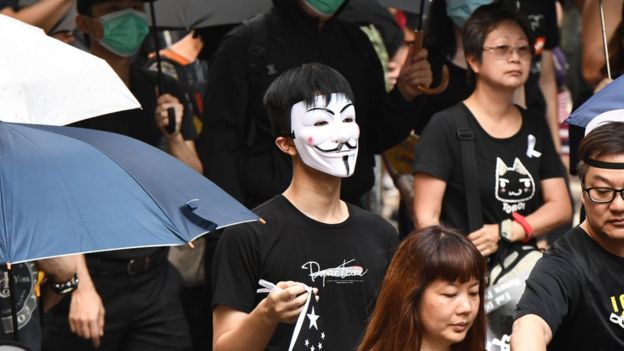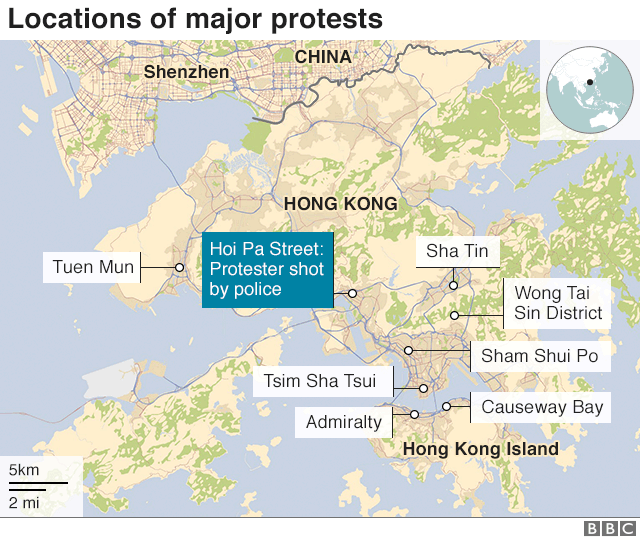
An activist involved in anti-Chinese protests in Hong Kong has been shot in the chest, police say.
The incident came as thousands of people demonstrated in defiance of a protest ban for the 70th anniversary of Communist rule in China.
Though people have been shot by rubber bullets in previous protests, this is the first injury from a live round.
Nearly four months of protests in Hong Kong have challenged Chinese President Xi Jinping's vision of national unity.
Earlier, the Chinese flag was raised at a special ceremony in the territory.
Security was tight and the 12,000 invited guests watched the event on a live video feed from inside a conference centre.
On what is being described by protesters as a "day of grief", people took to the streets in central Hong Kong and at least six other districts, blocking roads in some areas.
Thirty-one people were injured during the clashes, as police fired tear gas and protesters threw petrol bombs.
Two are in a critical condition, including the protester who was shot with a live bullet.
Videos of the shooting incident show protesters with umbrellas and metal poles clashing with police, one of whom discharges his weapon.
Another video shows the injured man - a student - lying on the ground, saying: "Send me to hospital. My chest is hurting, I need to go to hospital."
A classmate of the protester told the BBC that the man's injuries were not life-threatening.
"We felt horrible when we saw him suffer in the video," he said, adding that fellow students wanted to start a crowdfunding campaign for him.
Police tried to disperse the protesters - who were armed with umbrellas, projectiles and petrol bombs - with tear gas, rubber bullets and water cannon spraying blue dye to make it easier to identify them later.

A protester wearing a Guy Fawkes mask was seen holding a Chinese national flag that had been coloured black
Protesters are in retreat but have been setting fire to barricades as they go. Many were seen being wrestled to the ground by police, some of them bleeding.
At least 15 metro stations and numerous shopping centres in the city have been closed, and some 6,000 officers have been deployed in the territory.
An annual fireworks display had earlier been cancelled.
Hong Kong has been a part of China since 1997 but has its own system of law and government - known as One Country Two Systems.
In recent years, there has been increasing opposition to what has been seen as the growing influence of Beijing on Hong Kong's society and politics.
Hong Kong always sees anti-Beijing protests on 1 October, and this year they were expected to be larger than ever, because of the months of unrest triggered by proposed changes to the extradition law.
The changes would have made it possible for China to extradite people to the mainland from Hong Kong, something opponents felt put Hong Kongers at risk of persecution in unfair trials.
For nearly four months, protesters have taken to the streets - at times reported to be in the millions.
The proposed changes to the extradition law have officially been scrapped but that has failed to quell the unrest, which has now evolved into an existential battle over Hong Kong's future.
